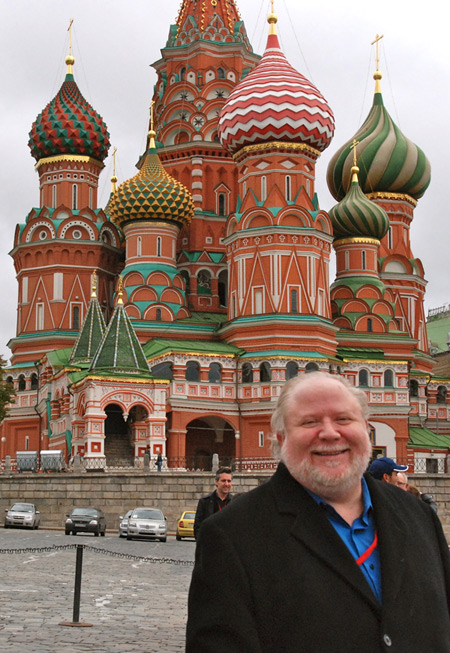MOSCOW, October 3, 2011.
Where there are people, there’s news.
And where there’s news, there are journalists.
Why? Because we have learned that when professionals make it their business to look at the world as it really is, we all benefit.
Examples:
-
Two news organizations, ProPublica and National Public Radio, revealed that military doctors were wrongly over-treating American veterans who had concussions. Fixing this will save at least $200 million.
-
The Center for Public Integrity and the Washington Post exposed bad federal housing policies, and six big lenders were dumped. Taxpayers will save more than $100 million.
-
The Center for Investigative Reporting detailed earthquake hazards in California schools, and officials opened up a $200 million safety fund.

Eric Newton in Moscow, Russia
Three stories, with a social impact of more than $500 million.
The value of watchdog journalism.
Doing stories that keep government more honest is still a big part of the modern role of professional journalism. Where the press is free, corruption is low.
But there are new roles as well.
The three stories given today as examples each were reported with nonprofit news organizations. One, Pro Publica, won America’s highest award for journalism, the Pulitzer Prize, in its first year of existence. In its second year, it won another.
Forming new kinds of news organizations is part of a modern journalist’s role.
The stories shared here were collaborations. News people partnered instead of competed. Profits and nonprofits worked together. Collaborating is now part of a journalist’s role, including tapping the wisdom of the crowd.
The world is awash in a sea of data. We give people lifeboats of meaning on which to navigate that sea. Mining, curating, verifying, clarifying data is part of our role.
The digital age brings powerful tools. New tools make new rules. That means new ethics. Do we have an ethical obligation to be transparent, to be interactive? Keeping ourselves honest is part of our role.
Some universities teach 21st Century journalism. How to create and run media companies. How to work with computer scientists to invent digital tools. How to create cultures of continuous change. How to interact with communities. Supporting good journalism education is part of our role. If we fail to engage the next generation we lose them – and our future.
Today, anyone with a broadband connection can create news, pass it along, critique it. We must tell the story of how people need reliable news and information to run their communities and their lives. We should tell people a lot more about how and why journalists do what we do. Promoting media literacy in the digital age is part of our role.
Industrial-age news lumbered off the assembly line: journalist, story, newspaper, audience. Digital age news flashes through the interactive network. It’s all different. Journalists can be citizens. Stories can be databases. Media can be smart phones. Audiences can be interactive. Redefining our role is part of our role.
Professional journalists matter. We are as important as ever.
Here is the proof: People keep killing us.
In the United States, we found a powerful approach to the murder of journalists in 1976, when a car bomb killed Arizona Republic reporter Don Bolles. Dying, he whispered the word “mafia.” Journalists came from all over to create the Arizona project. They finished Don’s work. Exposed, his murderers went to jail.
The journalists went on to form Investigative Reporters and Editors, a professional group that thrives today with more than 4,000 members.
So when a man with a shotgun killed Oakland Post editor Chauncey Bailey on a street corner in 2007, we knew what to do.
Finish the story. Find the killers.
Journalists in California created the Chauncey Bailey project. They came from all media, nonprofits, schools. They finished Chauncey’s story about the shaky finances of a local bakery, tying it to killings and kidnappings. Three were jailed. Oakland’s police chief resigned after reporters revealed that police had been planning to raid the bakery, but delayed it. Then they covered it up because that raid would have saved Chauncey’s life.
This summer, the verdicts came. The man who ordered Chauncey’s murder and his accomplice are guilty: Life in prison, no parole. The man who pulled the trigger confessed and got 25 years.
Prosecutor Nancy O’Malley said “I would especially like to recognize and acknowledge the Chauncey Bailey Project (which) worked diligently and tirelessly to ensure that the defendants responsible for these senseless murders were brought to justice.”
She said “violence against the free voice of the press will not be tolerated in our society.”
Ensuring murders go to prison is part of our role.
Is it all too much? With our new tools today, an individual journalist can do more now than ever. Our profession is limited only by our own imagination – and our courage.
Thank you.
